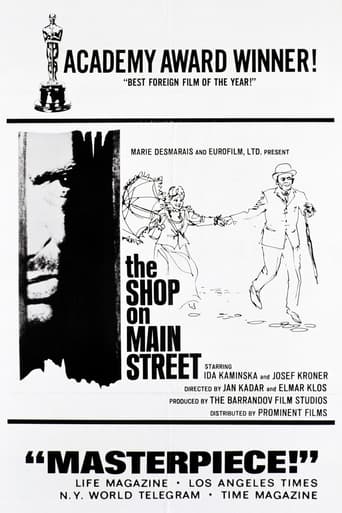Gauglini Gogini
And by breathtaking I mean literally breathtaking - while watching this movie, from time to time, especially during the last 30 or so minutes, you will realize that you are not breathing. I don't know what else to say, everything has already been said in other reviews. Naturally, I've heard about this movie before, I knew that it was the only Slovak movie to ever win an Oscar, I've read the reviews, but I was a bit hesitant to watch it because I know how badly many of the great old movies age and I didn't want to be disappointed. Well, I wasn't. This movie didn't age well, this movie simply doesn't age at all. The reason for this is that it deals with an eternal internal conflict in all humans - a conflict between what is good for me and what is moral. And what is "good" anyway? What is "moral"? What is the right thing to do? Is it always right to do the right thing? Is it always wrong to do the wrong thing? Where is the balance? Is there a balance? The main protagonist keeps asking these questions until it is too late. And most of all, he forces you to keep asking these questions yourself. You will keep asking yourself these questions long after watching this movie. And the only answer you will be able to come up with is "I don't know! I don't want to answer!" Just like Tono Brtko didn't want to answer them. It is a story of an ordinary man in extraordinary circumstances. A story of an ordinary man being forced to make a decision that no one wants to make. A decision that makes you choose between two wrong outcomes. The acting is simply perfect, there is no other word to describe it. Kaminska is perfect, Kroner is perfect and they are both perfect together. If there was an Oscar awarded for the best chemistry between two main protagonists, these two would definitely win it (and to this day I haven't seen any duo perform better).The final dream sequence is the best dream sequence I have ever seen in a movie, especially if you notice all the symbolism. It shows the contrast between what is and what could be. Between what podiums and uniforms are used for and what they could be used for. And ultimately, a contrast between the good in each and every one of us and the evil in each and every one of us.Watch this movie and you will never forget it. Trust me.
deschreiber
I have little more to add to the praise in all the other comments here, except perhaps to suggest that some of them go too far. It's an excellent film, well worth seeing, very moving and very believable, all the more effective for the way it moves so quietly, step-by-step from common, everyday life to something more horrible. A scene that will stay with me is when all the town's Jews are gathered with their bags and suitcases in the town square, then are led off in a grim procession and disappear around a corner. No shooting, no beating, but it gives one the shivers.I did find the ending disappointing. I don't think a man like that would commit suicide. Yes, he would feel terrible about causing the death of the old lady, and he would be afraid of being beaten and killed for having harbored a Jew. But he is not a brave man--far from it. I don't think he has the firmness of will to hang himself. I think he'd run away and hide. After being found, he'd place his hopes in begging for forgiveness from his Fascist brother-in-law before taking his fate into his own hands. So the suicide struck me as conventional, too easy, just a convenient way to round off the plot.
hasosch
"Ich Tanze Mit Dir In Den Himmel" has been a famous German Schlager of the 50ies. The dance has here not a choreographic but a metaphysical function: it bridges between life and death, expressing either the resolved joy of having been able to let back the heaviness of earth, or, preferably, as disguising means in front of the nothing sensed as Horror Vacui. In order to show the relevance of this observation for "Obchod Na Korze" (1965, directed by Jan Kadar and honored by a Oscar for Best Foreign Film of the Year), I have to disclose some details that some readers may interpret as spoilers.Slovakia, Rosenau/Rozsnyo (where Peter Lorre alias Laszlo Löwenstein was born), one thousand years Hungarian, since 1920 part of the newly found Cseh-Slowak Republic, 1942. Late like almost everywhere in Eastern Europe, the Nazis invade the Pre-Carpathian lands and hurry to evacuate all Jews in order to transport them to Russia. But here is on Main Street the little Shop of the widow Lautmann, 78 years old, alone, practically without income, profiting from the benefits of the Jewish community. And there is, a little distant, on his farm, the carpenter Brtko who is under pressure of his beautiful, but stupid and in the end brutal wife - and also of the husband of her sister, one of those who have read very early the signs of time and joined the National Socialist Party.Kolchozky is one of those who is charge for the extirpation of Jewishness in Rosenau. And he charges his slightly deficient brother-in-law Brtko as "Arizator" ("Arianizator"), responsible for taking over the little shop of Panie Lautmannova. However, Brtko is a man with his heart on the right spot. Pushed aside himself by society, he feels pity with the old and deaf Mrs. Lautmann as tries everything to save her life. However, one night, when the evacuation of the Jews has become ready, he looses his nerves, when the alphabet of the called-up names approaches the letter "L". In an overreaction, he forces the old woman into a cabinet and wants to deliver himself to the Nazis in order to save the old woman's life, although what await himself is death.But in the same moment, when he opens the door to deliver himself, the troupe starts to march, Mrs. Lautmann has simply been forgotten, and all his panic was in vain. When he hurries back to open the door of the cabinet, he find that Mrs. Lautmann is death, fallen over some furniture in her cabinet, possibly caused by his hasty hiding of her. Becoming aware of what he has done, he sees a hook in the roof, fetches a rope and hangs himself up. The music that starts Stante Pede, leads back to an earlier scene where Mrs. Lautmann is grieving about her deceased husband. The camera does not show the dead body of Brtko, but instead of that, the film becomes purposely overexposed, the door of the shop opens by itself, and in glorious sways out to the street are floating the rejuvenated Rozalia Lautmannova and Tona Brtko, dancing into the light. - All those who have had the pleasure to see R.W. Fassbinder's "Despair. A Trip into the Light" (1978), know: This is not the light of heaven, this is the light of darkness, not the brightly shining Pleroma (to say it in terms of Gnosis), but the light of the Kenoma.
jeremy3
Antonin lives modestly during WWII in a small Slovak town. One day, unannounced, his annoying and manipulative brother-in-law arrives. His brother-in-law has achieved a higher rank in the Slovak collaborator army. As repayment for an old debt, he offers Antonin the job as "Aryan Controller" for a Jewish button shop. No longer are Jewish people in town allowed to own shops.Antonin shows up at the shop, but the elderly Jewish woman is a bit senile, and doesn't understand his intentions. Immediately, a non-Jewish resident shows up and tells him that the real purpose for his new job will be to protect this Jewish woman from the authorities. A Jewish barber and a few other Jewish people in town (along with this non-Jewish citizen) have formed a protection organization.The movie becomes extremely stark and brutal when the Nazis are about to round up the Jewish people in town. The collaborators are shown as becoming complete fools and monsters. Antonin tries desperately, and on point of insanity, to protect the elderly Jewish woman. However, the ending can only be in tragedy.This movie probably won't translate well to a modern audience. It is very brutal and realistic. It is not "politically correct". Antonin is not a completely nice or pleasant person, but he does decide to protect the Jewish woman. I would recommend seeing this film, but remembering it is not a modern Hollywood film.






